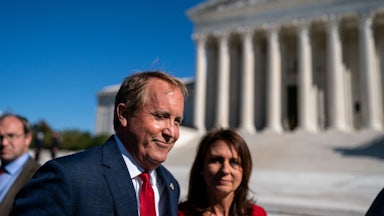It is with a heavy heart that I must report that Judge Reed O’Connor is at it again. The Texas-based federal judge struck down a major part of the Affordable Care Act on Thursday, this time targeting a provision that required health insurers to cover certain preventive care measures at no cost. Unlike past O’Connor rulings, this one does not imperil the entire ACA. But it still risks worsening health care costs for millions of Americans.
Ruling against the ACA is a habit of sorts for the George W. Bush appointee, who took the bench in 2007. Conservative litigants have used and abused Texas’s forum-selection rules to put lawsuits before unusually sympathetic conservative judges to achieve right-wing policy goals. O’Connor was the favored destination of such suits for years: He has found the ACA to be unconstitutional, either in whole or in part, at least four times now, leaving the appellate courts to clean up his many messes.
Most famously, he ruled in 2018 that the entire Affordable Care Act was unconstitutional after the Republican-led House zeroed out the penalty for individuals who didn’t purchase health insurance. His interpretation of the law was considered so preposterous that it was widely condemned by legal experts, including those who had been on both sides of the initial wave of legal challenges to the ACA. The Supreme Court ultimately overturned O’Connor’s decision in a 7–2 decision where even Justice Clarence Thomas voted to save the law.
So what does O’Connor have in store for us this time around? At issue in Braidwood v. Becerra is preventive care. The Affordable Care Act made wide-ranging changes to the American health care system. One of them was a mandate for insurance companies to cover many forms of preventive health care without cost-sharing. This includes screenings for STD infections, conditions like osteoporosis and diabetes, certain pregnancy complications, the most common types of cancer, and more. Under the ACA, recommendations for preventive care mandate coverage are made by the aptly named Preventive Services Task Force, or PSTF, a group of nonpartisan experts who advise the Centers for Disease Control and Prevention director on a part-time basis.
The mandates’ goal is to lower health care costs over the long term by catching and preventing conditions before more drastic (and more expensive) treatment becomes necessary. It is hard to argue against preventive care, either on moral grounds or on public health grounds. But the plaintiffs in this case, which include two companies and a handful of individuals, nonetheless made their best effort. They argued, among other things, that the preventive care mandates violate their religious beliefs by forcing them to participate in health care decisions with which they disagree.
The named plaintiff, Braidwood Management, provides health insurance to about 70 employees. Its owner, Steven Hotze, wants to prevent those employees from obtaining coverage for PrEP drugs, which prevent HIV transmission, as well as contraceptives because he thinks those portions of their health insurance encourage behavior that he finds objectionable on personal religious grounds. Hotze is no stranger to legal battles: He was indicted last year in Texas for his role in a bizarre scheme to find fraudulent ballots that ended with his private investigator pointing a gun at an air-conditioning repairman. No such ballots were found.
When his underlings are not holding people at gunpoint, Hotze also spends his time as a major donor to GOP causes and candidates. Anti-LGBT activism is a cause that is near and dear to his heart. He has reportedly likened gay and lesbian Americans to Nazis, argued that “Satanic cults” are behind the gay rights movement, and once compared LGBT people to “termites” that “eat away” at the “moral fabric” of the U.S. (Termites do not eat fabric, moral or otherwise.) In court filings, Hotze claimed that his opposition to the preventive coverage mandate was grounded in his sincerely held Christian beliefs and that allowing his employees to obtain PrEP drugs or contraceptives would violate those beliefs.
The first question in any lawsuit is whether the plaintiffs have legal standing to bring the case. For Braidwood, it is fairly straightforward since the company actively uses the plans. Other plaintiffs faced a more daunting obstacle: They don’t actually purchase health insurance plans. Kelley Orthodontics cited multiple reasons for dropping its coverage in 2016, including high costs as well as disagreements with what the plans covered. Some of these plaintiffs instead use a system known as Christian bill-sharing, where congregants pool their health costs and premiums and where ACA regulations do not typically apply.
The Justice Department argued during litigation that by forgoing participation in the regular health insurance market, those plaintiffs had no standing to sue over its mandates. Not to worry, O’Connor concluded. He ruled that those plaintiffs still have standing based on a legal theory known as the purchaser-standing doctrine. Under the doctrine, which O’Connor said originated in the D.C. Circuit but hadn’t previously been adopted in his own jurisdiction, the challengers can have standing in these types of cases when they have been “deprived of the opportunity to purchase a desired product due to government action.”
“The Plaintiffs need not act to violate their sincerely held religious convictions by purchasing a product they believe would make them complicit in objectionable conduct just to obtain standing,” O’Connor explained. “Defendants’ contrary assertion is both illogical and legally incorrect. Rather, Plaintiffs need only show their opportunity to purchase their desired product, as defined by its core features, has been reduced or eliminated.” This reasoning allows a single person with religious objections to the ACA’s preventive care mandates to effectively block them for more than 300 million other Americans.
Last year, at an earlier stage in litigation, O’Connor also ruled that the PSTF’s structure violated the Constitution’s appointments clause. That clause, in this context, generally requires that executive branch officers who wield significant powers—ambassadors, U.S. attorneys, federal marshals, and so on—be appointed by the president and confirmed by the Senate. This typically only applies to a narrow, topmost slice of the federal government; hundreds of thousands of other civil servants are constitutionally considered to be “inferior officers” because they ultimately answer to the Senate-confirmed ones.
The plaintiffs nonetheless argued that the task force’s members exercised enough power that they fell under the appointments clause. This would be a problem if it were correct because the Senate didn’t confirm anyone to those positions, casting its decisions since the ACA’s enactment in 2010 into doubt. The Justice Department sharply disagreed with that view, emphasizing in court briefs that the task force wasn’t a government agency, that it only made recommendations that were accepted (and, in some cases, rejected) by an actual federal agency, and that its volunteer members don’t come close to meeting the employment or compensation thresholds that normally define an “officer” of the federal government.
O’Connor disagreed. He concluded that the members fell under the appointments clause because the secretary of health and human services cannot order the task force to change its recommendations, only accept or reject them outright. If the secretary could issue such an order, of course, then it would defeat the purpose of having an independent group of advisers. It also did not matter that ultimate discretion still rests with the secretary; task force members cannot do anything legally binding without his assent. From there, O’Connor concluded that the task force’s members—unpaid part-time temporary volunteers who only issue recommendations—are actually illegally appointed federal officials who unlawfully wield the constitutional powers of the U.S.
Federal judges, like anyone else, can reach different conclusions about legal and constitutional questions in good faith. For a judge with a track record of fashioning his legal reasoning to suit a particular agenda—in this case, dismantling the Affordable Care Act—that benefit of the doubt may be somewhat lessened. It also does not help that O’Connor’s shoddy work extends beyond the health care sphere. The Supreme Court is currently wrestling with his ruling in 2021 that struck down the Indian Child Welfare Act of 1973 at the request of Christian non-Native families that want to adopt Native children. In that decision, O’Connor butchered Supreme Court precedents to rule that the law was racially discriminatory, even though federal Indian law is built on the understanding that tribal governments are sovereign nations, not mere racial groups.
O’Connor delayed his remedy for the PSTF ruling last year until he received further briefing from the parties on other aspects of the case. That culminated in Thursday’s decision, in which O’Connor issued a nationwide injunction to block the PSTF’s recommendations since 2010. While the task force existed before the ACA’s enactment, health law experts noted that many of its recommendations have been proposed or rewritten since then, throwing most of them into jeopardy. And more recent ones, like the one involving PrEP drugs, are wholly new and thus invalid in their entirety. The result, without intervention by courts or Congress, would be devastating for an untold number of Americans.
For now, the case will almost certainly be appealed to the Fifth Circuit Court of Appeals and likely move on to the Supreme Court for review. O’Connor’s decisions get overturned by those courts with some regularity, and it may happen yet again in this case. If the appellate courts strike down yet another one of his rulings, it might be in their best interest—and everyone else’s—to admonish him directly for wasting everyone’s time. Surely Reed O’Connor can find a better hobby than this.










